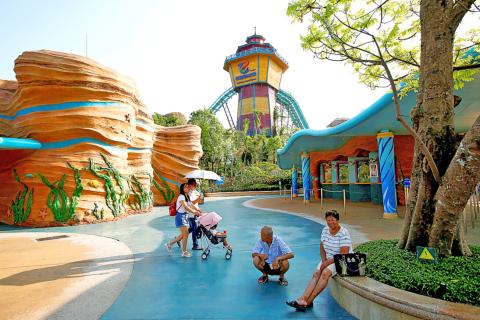Just a stone’s throw across a narrow waterway from the world’s largest gambling hub, Macau, a former oyster farming island is being transformed into China’s newest tourism haven.
Dubbed by some as China’s answer to Florida’s Orlando — a global tourist magnet with its cluster of major theme parks — Hengqin has seen property prices more than double over the past two years.
While still a dusty mass of construction sites, Hengqin draws millions annually to its anchor attraction, the Chimelong Ocean Kingdom (長隆海洋王國) theme park, with a slew of hotel, malls and sprawling residential developments being built nearby.

Photo: Reuters
Spanish soccer club Real Madrid last week announced they would open an interactive “virtual reality” complex in Hengqin, in partnership with Hong Kong-listed developer Lai Sun Group (麗新集團).
The 12,000m2 venue, set to open in 2021, is to include virtual reality entertainment and a museum showcasing the club’s history.
The transformation of Hengqin, which is three times as large as Macau, is part of Beijing’s efforts to bolster links between Hong Kong, Macau and nine cities in the Pearl River Delta region, or the so-called “Greater Bay Area,” modelled after other dynamic global bay areas such as Tokyo and San Francisco.
“Hengqin will be the Orlando of China. Macau is Las Vegas [and] Hong Kong is New York,” said Larry Leung (梁浩昌), an executive with Lai Sun that is helping build the Real Madrid complex at its “Novotown” project in Hengqin. “Within an hour you can have them all.”
Novotown’s entertainment mix is also to feature China’s first Lionsgate movie world with theme rides from blockbuster films, such as the Hunger Games and Twilight, as well as a National Geographic educational center.
High-end hotel chains and luxury yacht makers are building more hotels and a marina on Hengqin.
Chinese officials see Hengqin helping Macau diversify away from casinos to a more wholesome tourism industry. More than 80 percent of Macau’s public revenues come from the gambling sector.
Businesses in Macau have been encouraged to invest in Hengqin with the government providing cheaper rent and tax subsidies.
Galaxy Entertainment Group (銀河娛樂), Shun Tak Holdings Ltd (信德集團) and Macau Legend Development Ltd (澳門勵駿) have also earmarked developments for Hengqin.
Realtors expect property prices to keep rising once a sea bridge linking Hong Kong, and a high-speed rail station are completed.
Hoffman Ma (馬浩文), deputy chairman of Success Universe Group Ltd (實德環球), which operates the Ponte 16 casino in Macau, said Hengqin could take some convention and exhibition business away from the former Portuguese colony.
“It doesn’t make sense for Macau to do that, due to a consistent labor shortage,” he said.
Industry reports show 8.5 million people visited China’s top theme park last year, more than Hong Kong Disneyland’s 6.1 million, and almost a third of the 28 million people who visited Macau last year.

The US dollar was trading at NT$29.7 at 10am today on the Taipei Foreign Exchange, as the New Taiwan dollar gained NT$1.364 from the previous close last week. The NT dollar continued to rise today, after surging 3.07 percent on Friday. After opening at NT$30.91, the NT dollar gained more than NT$1 in just 15 minutes, briefly passing the NT$30 mark. Before the US Department of the Treasury's semi-annual currency report came out, expectations that the NT dollar would keep rising were already building. The NT dollar on Friday closed at NT$31.064, up by NT$0.953 — a 3.07 percent single-day gain. Today,

‘SHORT TERM’: The local currency would likely remain strong in the near term, driven by anticipated US trade pressure, capital inflows and expectations of a US Fed rate cut The US dollar is expected to fall below NT$30 in the near term, as traders anticipate increased pressure from Washington for Taiwan to allow the New Taiwan dollar to appreciate, Cathay United Bank (國泰世華銀行) chief economist Lin Chi-chao (林啟超) said. Following a sharp drop in the greenback against the NT dollar on Friday, Lin told the Central News Agency that the local currency is likely to remain strong in the short term, driven in part by market psychology surrounding anticipated US policy pressure. On Friday, the US dollar fell NT$0.953, or 3.07 percent, closing at NT$31.064 — its lowest level since Jan.

The Financial Supervisory Commission (FSC) yesterday met with some of the nation’s largest insurance companies as a skyrocketing New Taiwan dollar piles pressure on their hundreds of billions of dollars in US bond investments. The commission has asked some life insurance firms, among the biggest Asian holders of US debt, to discuss how the rapidly strengthening NT dollar has impacted their operations, people familiar with the matter said. The meeting took place as the NT dollar jumped as much as 5 percent yesterday, its biggest intraday gain in more than three decades. The local currency surged as exporters rushed to

PRESSURE EXPECTED: The appreciation of the NT dollar reflected expectations that Washington would press Taiwan to boost its currency against the US dollar, dealers said Taiwan’s export-oriented semiconductor and auto part manufacturers are expecting their margins to be affected by large foreign exchange losses as the New Taiwan dollar continued to appreciate sharply against the US dollar yesterday. Among major semiconductor manufacturers, ASE Technology Holding Co (日月光), the world’s largest integrated circuit (IC) packaging and testing services provider, said that whenever the NT dollar rises NT$1 against the greenback, its gross margin is cut by about 1.5 percent. The NT dollar traded as strong as NT$29.59 per US dollar before trimming gains to close NT$0.919, or 2.96 percent, higher at NT$30.145 yesterday in Taipei trading